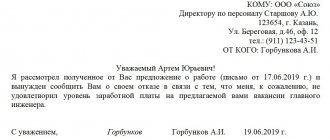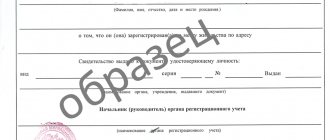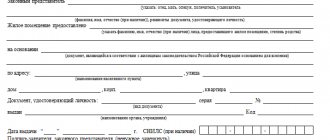We previously published an article on how to protect your rights if your organization is sued. However, it may happen that the company itself needs to challenge someone’s actions. This article will discuss how to formalize everything correctly when filing a claim.
In practice, the most common situation is when a claim is filed against another company, less often - against the controlling organization. Cases when a company sues a citizen almost never occur in practice. This can happen if, during the consideration of a consumer’s claim against a trading company, an examination establishes that the goods sold by the company are of high quality. In such a situation, the company has the right to recover from the buyer the costs of conducting the examination.
Which court should I go to?
To protect its rights in court, a firm must determine in which court to file a claim. If you intend to make a claim to another company (entrepreneur) or controlling organization, then the claim must be filed in an arbitration court. And if the defendant is a citizen , it will be a civil one. In addition, you need to decide in which area the court you need is located.
As a general rule, claims between firms (entrepreneurs) are considered in the arbitration court of the constituent entity of the Russian Federation in which the defendant or his property is located. This is stated in Art. 35 Arbitration Procedure Code of the Russian Federation. Art. 36 of the Arbitration Procedure Code of the Russian Federation provides for the possibility of jurisdiction at the choice of the plaintiff in the following cases:
- A claim against a defendant whose location or place of residence is unknown may be brought to the arbitration court at the location of his property or at his last known location or place of residence in the Russian Federation.
- A claim against defendants located or residing in the territories of different constituent entities of the Russian Federation is brought to the arbitration court at the location or place of residence of one of the defendants.
- A claim against a defendant located or residing in the territory of a foreign state may be brought to the arbitration court at the location of the defendant’s property on the territory of the Russian Federation.
- A claim arising from an agreement that specifies the place of its execution may also be brought to the arbitration court at the place of execution of the agreement.
- A claim against a legal entity arising from the activities of its branch or representative office located outside the location of the legal entity may be brought to the arbitration court at the location of the legal entity or its branch or representative office.
- Claims for compensation for losses caused by a collision of ships, recovery of remuneration for assistance and rescue at sea may be brought to the arbitration court at the location of the defendant’s ship or the home port of the defendant’s ship, or at the place where the losses were caused.
In this case, the choice between the arbitration courts that have jurisdiction over the case belongs to the plaintiff.
However, firms can agree that their dispute will be heard in a specific court. However, such an agreement must be concluded before the court accepts the claim. This right is provided by Article 37 of the Arbitration Procedure Code of the Russian Federation.
If desired, disputing firms or entrepreneurs can agree to have their case heard in arbitration . This may be a permanent arbitration court formed by a chamber of commerce, a stock exchange, a public association and other organizations, as well as an arbitration court that the parties themselves form to resolve a specific dispute.
If a company has to sue a citizen , the statement of claim must be filed in the court of the district where the citizen lives. Just as in an arbitration dispute, the plaintiff and defendant can agree on the place of consideration of a civil claim themselves. But this must be done before the court accepts the claim. This is stated in Article 32 of the Code of Civil Procedure of the Russian Federation.
In civil disputes, there is a dependence on the amount of the claim. If the price of a claim against a citizen does not exceed 50,000 rubles, the case will be considered by a magistrate (clause 5, part 1, article 23 of the Code of Civil Procedure of the Russian Federation). If the amount of the claim exceeds this figure, the district court will take up the case.
- South Coast+
- —
- Legal services to citizens. Individuals. Civil, housing, family disputes.
- —
- Drawing up statements of claim and claims
- —
- Drawing up a statement of claim
- —
- Articles
What is a claim? How is a claim filed? In which court is the claim filed?
The claim defense mechanism is now actively used by both individuals and legal entities. Today, the claim has become a truly effective and universal tool for protecting violated rights and legitimate interests.
But if you do not want or cannot pay for the services of a lawyer, and are ready to go to court at your own peril and risk, then we would like to give general recommendations on drawing up and filing a statement of claim.
- How to file a claim yourself?
Everyone can defend their personal interests through judicial protection. You do not need to have a law degree or be a lawyer to do this. Litigation is burdensome with time and the necessary knowledge that you will have to acquire yourself at each stage of the proceedings.
In order not to have to figure out what situation led to the decision to file a claim on your own, the main fundamental condition is that it must be a civil case. The main thing here is to tune in to the final goal, on the way to which you will have to go through all the preparatory and procedural procedures: competently draw up and submit a statement of claim to the court, conscientiously take part in the consideration of the case by the court and achieve a successful resolution of the case. Where to start and what actions will need to be taken? First you need to collect information. Look for similar situations on the World Wide Web and ask your friends. Write down questions you have as you learn new information. Visit the court, see when the judge meets, and whether he is on vacation, check the details for paying the state fee, at the same time visit the court, and become imbued with its atmosphere and specific procedures.
Filing a claim in court occurs in the manner prescribed by law. A magistrate, a federal court of general jurisdiction, an arbitration court or an arbitration court, protects violated or disputed civil rights in accordance with the jurisdiction of cases established by procedural legislation.
First, you need to find out where to submit your application, to a magistrate or to a district court - if the dispute is not economic, and to an arbitration court - if the dispute arises from business activity. This is called jurisdiction.
- Jurisdiction of cases by courts
This is the division of cases under consideration between courts, in accordance with their competence. According to Art. 22 of the Code of Civil Procedure, if a statement of claim to the court provides for the participation of citizens in the protection of their rights, then its consideration is subject to a court of general jurisdiction. Disputes regarding business activities are subject to the jurisdiction of the arbitration court (Article 27 of the Arbitration Procedure Code of the Russian Federation).
Secondly, the jurisdiction to consider the claim should be determined.
- Jurisdiction
This is a delimitation of competence in the category of disputes between courts. Articles 23 and 24 of the Code of Civil Procedure of the Russian Federation distinguish disputes into categories that can be considered in courts of general jurisdiction: some by a magistrate, and some by a district court.
- Civil cases under the jurisdiction of a magistrate.
The magistrate judge, as a court of first instance, considers: cases of issuing a court order; cases of divorce, if there is no dispute between the spouses about children; on the division of jointly acquired property between spouses if the value of the claim does not exceed fifty thousand rubles; cases arising from family legal relations, with the exception of cases of challenging paternity (maternity), establishing paternity, deprivation of parental rights, limiting parental rights, adoption of a child, other cases of disputes about children and cases of recognition the marriage is invalid; cases on property disputes, with the exception of cases on inheritance of property and cases arising from relations on the creation and use of results of intellectual activity, with the cost of the claim not exceeding fifty thousand rubles; cases on determining the procedure for using property, as well as other cases referred by federal laws to the jurisdiction of justices of the peace.
- Civil cases within the jurisdiction of the district court
.
The district court, as a court of first instance, considers all other civil cases that are beyond the jurisdiction of the magistrate.
Thirdly, it is necessary to determine in which territorial court the claim should be filed.
- To which court is the claim filed?
There is a general rule for filing a claim at the place of residence of the defendant, by which you can apply to a magistrate or district court. A claim against a legal entity is brought at the location of the organization. When filing a claim in court, the Code of Civil Procedure of the Russian Federation also provided for some features, namely jurisdiction at the choice of the plaintiff (Article 29 of the Code of Civil Procedure). A claim against a defendant whose place of residence is unknown or who does not have a place of residence in the Russian Federation may, at the choice of the plaintiff, be brought at the location of the defendant’s property or at his last known place of residence. A statement of claim arising from the activities of a branch of an organization may be filed at the location of the branch. Statement of claim for the recovery of alimony, for the establishment of paternity, for divorce (if there is a minor or for health reasons it is difficult for the plaintiff to travel to the defendant’s place of residence), for compensation for damage caused by injury, other damage to health or as a result of the death of the breadwinner, for restoration labor, pension and housing rights, return of property or its value related to compensation for losses caused to a citizen by illegal conviction, illegal prosecution, illegal use of detention as a preventive measure, recognizance not to leave, or illegal imposition of administrative punishment in the form of arrest - can be presented at the place of residence of the plaintiff.
You can go to court for a claim for the protection of consumer rights at the place of residence (place of stay) of the plaintiff or at the place of conclusion (place of execution) of the agreement. The choice between several courts that have jurisdiction over the case belongs to the plaintiff, in accordance with paragraph 10 of Article 29 of the Code of Civil Procedure of the Russian Federation.
Complaints against the actions or decisions of state bodies, local government bodies, and officials are filed with the district court at the discretion of citizens at their place of residence or at the location of the body where the official whose actions are being appealed has a place of work. Claims for rights to a building, land plots, for the release of property from seizure are within the jurisdiction of the court at the location of the property or land plot, in accordance with Article 30 of the Code of Civil Procedure of the Russian Federation. At the place of opening of the inheritance, the court has jurisdiction over the appeals of the testator's creditors, submitted before the heirs accept the inheritance.
A claim against the carrier arising from the contract of carriage is strictly filed at the location of the carrier. It is mandatory to file a claim in accordance with the established pre-trial procedure. When going to court, the parties, by agreement, can change the territorial jurisdiction for the case being initiated, before the court accepts it for proceedings. Exclusive jurisdiction (Articles 26, 27 and 30 of the Code of Civil Procedure) cannot be changed by agreement between the parties.
When filing a claim against several defendants at once, located or residing in different places, the place of presentation will be the place of residence or location of one of the defendants at the choice of the plaintiff.
A counterclaim is filed in the court at the place where the original claim was considered, regardless of its jurisdiction.
In cases where a civil claim arises from a criminal case (if it was not filed or was not resolved during the criminal case), it is filed for consideration in civil proceedings and according to the general rules of jurisdiction.
So, the law directly indicates in which cases a statement of claim is filed in court at the place of residence of the defendant, plaintiff or the location of the property (Articles 28 - 32 of the Code of Civil Procedure of the Russian Federation).
Let's look at a couple of examples of the jurisdiction and jurisdiction of courts:
Claim for debt collection of 100,000 rubles. under an interest-free loan agreement
Subject to the jurisdiction of a court of general jurisdiction (Article 22 of the Civil Procedure Code of the Russian Federation) Subject to the jurisdiction of a district court (Article 24 of the Code of Civil Procedure of the Russian Federation) Submitted at the place of residence of the defendant. (Article 28 of the Code of Civil Procedure of the Russian Federation)
Claim for alimony
Subject to the jurisdiction of a court of general jurisdiction (Article 22 of the Code of Civil Procedure of the Russian Federation) According to the category of the case, it is considered by a magistrate (Article 23 of the Code of Civil Procedure of the Russian Federation). Territorial jurisdiction is at the choice of the plaintiff (Article 29 of the Code of Civil Procedure of the Russian Federation).
The success of a legal case depends significantly on the competent and correct preparation of the statement of claim and compliance with all the rules applicable to the claim.
So, we must know that the basis for initiating legal proceedings
in court is
a statement of claim
.
The statement of claim is submitted to the court in writing. The content requirements are listed in Part 2 of Art. 131 Code of Civil Procedure of the Russian Federation.
The statement of claim must indicate:
1) the name of the court to which the application is submitted;
2) the name of the plaintiff, his place of residence or, if the plaintiff is an organization, its location, as well as the name of the representative and his address, if the application is submitted by a representative;
3) the name of the defendant, his place of residence or, if the defendant is an organization, its location;
4) what is the violation or threat of violation of the rights, freedoms or legitimate interests of the plaintiff and his demands;
5) the circumstances on which the plaintiff bases his claims and evidence confirming these circumstances;
6) the price of the claim, if it is subject to assessment, as well as the calculation of the collected or disputed amounts of money;
7) information about compliance with the pre-trial procedure for contacting the defendant, if this is established by federal law or provided for by the agreement of the parties;
 list of documents attached to the application, namely:
list of documents attached to the application, namely:
— copies of the application in accordance with the number of defendants and third parties;
— a document confirming payment of the state duty;
— power of attorney or other document certifying the authority of the plaintiff’s representative;
- documents confirming the circumstances on which the plaintiff bases his claims, copies of these documents for defendants and third parties, if they do not have copies;
— the text of the published normative legal act in case of challenge;
— evidence confirming the implementation of the mandatory pre-trial dispute resolution procedure, if such a procedure is provided for by federal law or agreement;
- calculation of the amount of money being recovered or disputed, signed by the plaintiff, his representative, with copies in accordance with the number of defendants and third parties.
The application may indicate telephone numbers, fax numbers, email addresses of the plaintiff, his representative, the defendant, other information relevant to the consideration and resolution of the case, as well as the plaintiff’s requests.
If the prosecutor applies to protect the legitimate interests of a citizen, the application must contain a justification for the impossibility of bringing a claim by the citizen himself.
The statement of claim is signed by the plaintiff or his representative if he has the authority to sign the statement and present it to the court.
The statement of claim may also contain other information, for example, requests to secure claims, the need to summon witnesses and other persons to court, or send a request for other evidence that the plaintiff cannot obtain.
In some cases, decisions of the Supreme Court of the Russian Federation clarify what information must be indicated in statements of claim for certain categories of cases. According to paragraph 7 of the Resolution of the Plenum of the Supreme Court of the Russian Federation of November 5, 1998 No. 15 “On the application of legislation by courts when considering divorce cases,” the statement of claim indicates when and where the marriage was registered; whether there are common children, their ages; whether the spouses have reached an agreement on their maintenance and upbringing; in the absence of mutual consent to dissolve the marriage - the reasons for the dissolution of the marriage; Are there other claims that can be considered simultaneously with the claim for divorce. The application is accompanied by: a marriage certificate, copies of children’s birth certificates, documents on earnings and other sources of income of the spouses (if a claim for alimony is filed) and other necessary documents.
File a claim in court
It is advisable to succinctly, briefly, state the essence of the case and most clearly formulate the claims against the defendant. Do not forget that all the plaintiff’s demands must be justified. The judge considers the statement of claim to the court and makes a decision based on the rules of law and the evidence presented; accordingly, to simplify the judge’s understanding of the requirements, we recommend that in the statement of claim you refer to specific rules of law expressed in the Law.
Recommendations for drawing up a claim yourself:
When composing a document, divide it into three parts: introductory, descriptive and pleading.
Introductory part - information about the court where you are filing a claim, the plaintiff, the defendant, the cost of the claim, the cost of the representative’s services.
The descriptive part is information about what the violation or threat of violation of the rights or legally protected interests of the plaintiff consists of, evidence is provided, as well as excerpts from the Law.
The pleading part is the plaintiff’s demands against the defendant. It usually begins with the phrase: “Based on the above, I ASK: 1..., 2..., 3...)
How to file a claim
The statement of claim is one of the most important documents in a trial. This document is intended to give the judge a certain idea of the requirements presented by the plaintiff. That is why the drafting of a claim must be approached in the most careful manner.
The claim must be submitted in writing and signed by the head of the company or its representative. The basic requirements for the content of the statement of claim are contained in the Arbitration Procedure Code and the Code of Civil Procedure of the Russian Federation. These requirements are similar, and since a company most often applies to an arbitration court, we will consider the rules for drawing up a claim specifically for the arbitration process.
As stated in Art. 125 of the Arbitration Procedure Code of the Russian Federation, the statement of claim must indicate :
- 1. the name of the arbitration court to which you are filing a claim;
- 2.
the name of your company or your full name. as an entrepreneur, as well as postal address; - 3.
company name or full name the entrepreneur against whom you are making claims and their postal addresses; - 4.
the value of your claim if you are making property claims; - 5.
calculation of this amount; - 6.
your requirements with reference to laws and other regulations; - 7.
evidence confirming your case; - 8.
information on compliance with the pre-trial (claim) dispute resolution procedure, if provided for by law or contract; - 9.
information about the application by the arbitration court of interim measures before filing a claim; - 10.
list of attached documents (Article 127 of the Arbitration Procedure Code of the Russian Federation): documents confirming the authority of the person who signed the statement of claim (for an entrepreneur - a certificate of registration; for the head of a company - the charter of the company and an order for his appointment; for a representative of the company or entrepreneur - a power of attorney); - a payment document confirming the payment of the state duty or a petition for a deferment, installment plan, or a reduction in the amount of the state duty;
- copies of the certificate of state registration as a legal entity or individual entrepreneur;
- postal receipts confirming that you sent a copy of the statement of claim to the other party to the dispute - a company or entrepreneur;
- documents proving the validity of your claims (copies of contracts, acts, invoices, invoices, letters, etc.);
- copies of the arbitration court ruling on securing property interests before filing a claim;
- documents confirming the plaintiff’s compliance with the claim or other pre-trial procedure, if it is provided for by federal law or agreement.
- draft agreement, if a demand is made to compel the conclusion of an agreement.
You must submit to the court the documents you refer to in your claim. If you do not want to bring certain documents to court, you do not have to do this. However, keep in mind that the court can obtain the necessary documents from the defendant. For example, waybills, invoices, etc.
How much should I pay to go to court?
Conducting a trial requires material costs. Before going to court, the defendant must pay a state fee. There are two types of claims in claims: property and non-property; the amount of the duty and the calculation procedure depend on this.
In accordance with Article 333.19 of the Tax Code of the Russian Federation, for going to court with claims of a material nature, you must pay the following amounts:
- the amount of the claim is less than 20 thousand - 4% of the price, but not less than 400 rubles;
- claim amount from RUB 20,001. up to 100 thousand – 800 rub. and 3% of the value of the stated claims;
- amount of claim from 100,001 to 200 thousand – 3200 rubles. and 2% of the value of the stated claims;
- amount of claim from 200,001 to 1 million – 5,200 rubles. and 1% of the value of the stated claims;
- claims over 1 million – 13,200 rubles. and 0.5% of the value of the stated claims, but not more than 60 thousand.
When a claim of a non-property type or a claim of a property nature that cannot be assessed is filed, individuals must pay 300 rubles, legal entities 6 thousand rubles. You can familiarize yourself with an exhaustive list of state duty amounts in Article 333.19 of the Tax Code of the Russian Federation.
Sometimes it is difficult to determine the cost of a claim before filing; in such situations, you can ask the court to defer payment. The petition is submitted along with the claim in the form of a written petition.
When the case is over, all costs associated with the trial can be returned at the expense of the losing party. In order for the judge to make a decision indicating the recovery of expenses incurred from the defendant, these demands must be stated in the lawsuit or during the trial.
Privileges
Some categories of citizens are completely exempt from paying fees for going to court. The plaintiff does not pay a fee when filing claims:
- in relation to the collection of alimony payments;
- on the collection of wage arrears;
- on compensation for moral damage, as well as harm caused to health;
- when protecting violated consumer rights;
- in relation to compensation for material damage arising from the crime;
- when disabled people of groups 1 and 2 go to court;
- when pensioners submit non-property claims to the Pension Fund and executive authorities regarding pension issues.
Government duty
In order for the court to consider the case, it is necessary to pay a state fee. To do this, it needs to be calculated correctly . The amount of the state fee depends on the type of claim.
The amount of state duty for cases heard in courts of general jurisdiction by magistrates is determined in Art. 333.19 Tax Code of the Russian Federation; the amount of state duty for cases considered in arbitration courts - in Art. 333.21 Tax Code of the Russian Federation.
If you write a request to defer payment of the state fee , remember that the inability to pay it must be documented. For example, provide an account statement for your company, which shows that you have no money.
If the defendant is a supplier
In practice, situations where the supplier is the defendant are not uncommon. In this case, you need to take into account the following features of the relationship between the supplier and the buyer.
Most often, disputes arise if the supplier:
- did not deliver the goods to the buyer or delivered them untimely;
- transferred the goods in quantities other than those specified in the purchase and sale agreement;
- delivered goods out of stock;
- delivered the goods without accessories and documentation related to it;
- delivered goods of inadequate quality
Evidence of violations on the part of the supplier in these cases will be: an act of acceptance and transfer of goods or a separately drawn up act of defects, waybills, invoices, inventories, specifications, packaging labels, an application for the supply of products.
The acceptance certificate must indicate what specific shortcomings the product has (the assortment is broken, the quantity does not correspond to the contract, etc.).
Please keep in mind that the list of documents may change in each specific case. It depends on how the contract defines the transfer of goods, its range and other parameters.
How to find the court by the defendant's address?
Using the official website of the State Automated System “Justice”. You need to select the button “Federal Courts of General Jurisdiction” (if you are looking for a district or city court) or “Judges of the Peace”:
In the field that appears, check the box next to “I’m looking for a magistrate’s station,” select a region, write the name of the city and street. If one street belongs to several magistrates, a list of houses will appear separately for each site. Click on the name of the court district and you will see the address of the official website of the magistrate and his contacts.
On the official websites of courts you can often find samples of statements of claim for various occasions.
If the defendant is a controller
In a situation where a company files a claim against a controlling organization, the list of documents will be different. It depends on what kind of claim is made by the company . In practice, the most common claims and applications are those in which the plaintiff asks:
- recognize as illegal the decisions or actions of state authorities, local self-government and officials of these bodies,
- collect debts from government agencies (for example, collect a penalty if the company did not return tax payments on time).
In addition to the statutory documents, it is necessary to prepare copies of illegal requirements or decisions that were made by the controller in relation to the company. These may be demands to pay a tax, penalty or fine, an order to stop violating the law, a decision to provide a land plot, a requirement to provide documents relating to the economic activities of the company, etc. If you do not have these documents, then you must indicate their number and date of publication in the application. When a company wants to collect debts and losses, for example, from the tax office, it needs to prepare payment orders that confirm the amount of overpaid tax. Correspondence between the inspectorate and the company regarding the settlement of the dispute before trial will also be useful.
If the controlling organization took any illegal actions, then the supporting documents may be copies of protocols or inspection reports, seizure of documents, etc.









